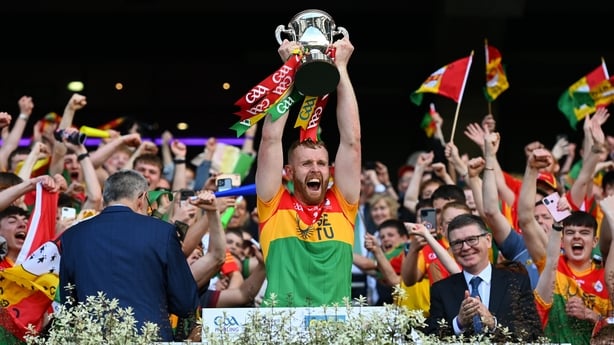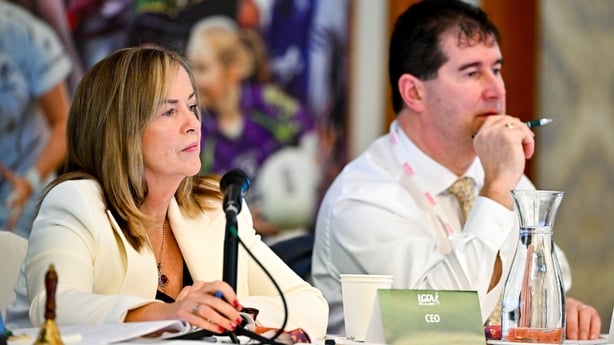Roll up, roll up, for the Special Congress!
It's a bonus edition of the GAA’s annual decision-making jamboree at Croke Park on Saturday but don’t let the name fool you, as Congresses go this one isn’t overly special.
There are just 11 relatively uncontroversial motions in all and the 280 odd-delegates will be free to tuck into their lón within a couple of hours.
Competition structure motions
Motion 1 proposes removing the preliminary quarter-finals in the All-Ireland senior hurling championship from next year, meaning the Joe McDonagh Cup finalists would no longer take part. Instead, the third-placed teams in Leinster and Munster would advance directly to the quarter-finals against the opposing provincial runners-up.
The McDonagh counties don’t want to lose the chance to face elite opposition - The GPA surveyed players from the nine counties who have played in the competition since it came into existence, with 74% of respondents opposed to the motion - but in the eight games under the current system (suspended due to Covid in 2020 and ’21) they have been on the winning side just once when Laois shocked Dublin in 2019.
Dublin beat McDonagh champions Carlow by 10 points this year and Tipperary ran up a championship record score of 7-38 against Offaly.
If Motion 1 is passed, Motion 2 would introduce a Joe McDonagh semi-final between the teams finishing second and third in the six-team group, with second having home advantage. The thinking here is to reduce the chance of counties being able to rest players in the fifth round, as Offaly did against Carlow this year, having already qualified for the decider.

Motion 3 would allow for the creation of tiered competitions, à la the Sam Maguire and Tailteann Cups, in the minor football championship after the round-robin stage. The top tier will remain a knockout competition, with the eight provincial winners and runners-up in quarter-finals.
Motion 4 would introduce preliminary quarter-finals and quarter-finals to the minor hurling championship. This year, the provincial stages concluded with a final and those teams advancing to semis but under this proposal the sides finishing third and fourth in Leinster and Munster would also progress to the knock-out stages.
Motion 5 would direct provinces to organise their U20 championships on a round-robin basis rather than straight knock-out. Last year, Leinster was a mix of both in hurling and football while the Connacht, Munster and Ulster U20 football championships were knock-out only.
Motion 6 might provoke a little more debate. It seeks to make permanent the temporary deviation that applied in 2022-23 that both All-Ireland finals should be played by the 30th Sunday of the year, rather than the 29th as currently applies. That would mean the latest the football final could happen would be 28 July, as will be the case in 2024. A proposal to push that date back a week into August was heavily defeated at a recent Central Council meeting but it will be interesting to see if the delegates have differing opinions. Though the motion being defeated would presumably mean even earlier finals next year.

Administration motions
Motion 7 would make it mandatory that a county’s Central Council delegate is also a member of the county’s management committee.
Motion 8 would allow Central Council delegates to serve for more than just the current single five-year term but not consecutively. So five years would have to elapse before the individual would be eligible to serve once more.
Motion 9 is the main reason this Special Congress is happening. Next year, the government will withhold funding (reportedly 50%) from sporting bodies that do not have at least 40% male and female representation on their boards.
This motion would commit to having those minimums on the GAA’s Central Council Management Committee (Coiste Bainistí).
Despite over 30% of club officers being female, the board currently has just three female members out of 19 (16%) but that would increase to 9/21 (43%) for 2024.
The motion also proposes that from 2027 a minimum of 7/16 board members would be female, including three of the four provincial representatives, one of the two independent appointees, one of the two representatives of Congress, as well as the LGFA and Camogie representatives. Of course, the three associations could become one.
Motion 10 would reformat the GAA’s Official Guide, providing for rules relating to procedures and policies to become known as 'codes’ and henceforth the responsibility of Central Council. Changing rules relating to the association’s aims, structures and playing rules would remain the preserve of Congress.
Motion 11 maintains the rule that a player must have turned 17 before 1 January to play adult club level that year but also allows county committees to increase this minimum eligibility age generally or in specific competitions / circumstances.
You can read the motions in full here (PDF format) if your heart so desires.


